- Latest articles
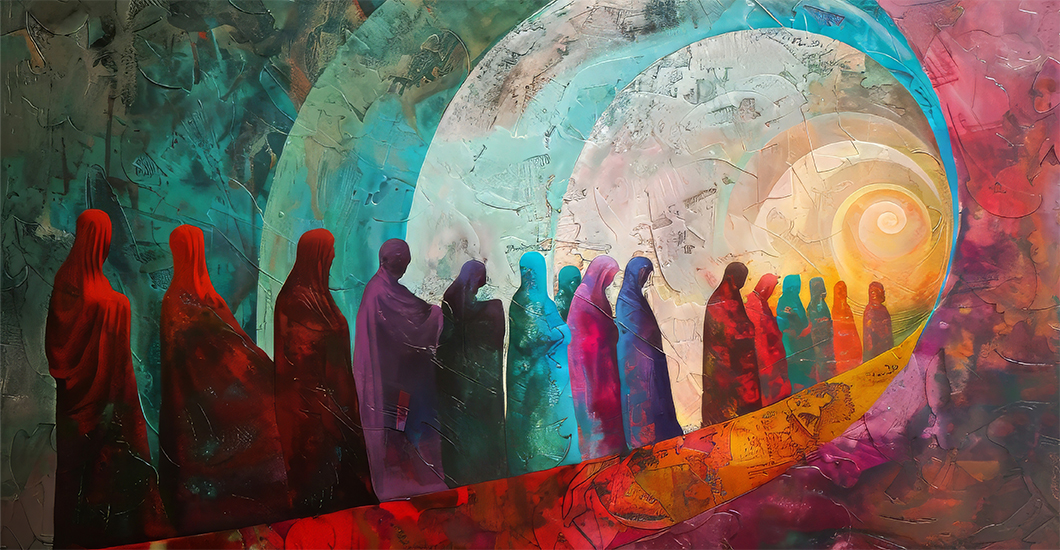
It is not easy to predict whether you will be successful, wealthy or famous, but one thing’s for sure– death awaits you at the end.
A fair bit of my time these days is taken up practicing the art of dying. I must say, I am enjoying every moment of this exercise, at least ever since I have come to the realization that I have entered the heavy end of the scales of time.
I am well and truly into and past the three score years and ten, and so I begin to think seriously: what positive preparations have I put in place for the inevitability of my demise? How stainless a life am I living? Is my life as free as possible from sin, especially the sins of the flesh? Is my ultimate aim saving my immortal soul from eternal damnation?
God, in His mercy, has allowed me ‘extra time’ in this game of life, in order for me to get my affairs (especially spiritual affairs) in order before I go over the top and into the shadows of the valley of death. I had a lifetime-plus to sort these out, but like many, I neglected the most important things in life, preferring to foolishly search for more wealth, security, and instant gratification. I can’t say I’m anywhere near successful in my endeavors as the distractions of life continue to plague me, despite my senior age. This constant conflict is ever so annoying and tormenting, yet when one can still be tempted, such wasted emotions are so futile.
Escaping the Inevitable
Despite my Catholic upbringing and its urging to embrace and look forward to the inevitable tap on the shoulder from God’s ‘Angel of Death,’ I’m still anticipating that letter from the King congratulating me on reaching ‘the big zero.’ Of course, like many in my age bracket, I am reaching out to stave off the inevitable by embracing any incentive to help prolong my earthly existence with medicines, hygiene, diet, or by whatever means possible.
Death is inevitable for everyone, even for the Pope, our loveable Aunt Beatrice, and royalty. But the longer we escape the inevitable, the more that glimmer of hope beams forth ever so faintly in our psyche—that we can push the envelope, put one more puff of breath into that balloon, extending it to its very outer utmost boundary. I suppose, in a way, that may even be the answer to successfully stretching the death date—that positiveness, that resistance to immortality. I have always thought, if I can avoid unjustifiable taxes by whatever means, then why not try avoiding the other certainty, death?
Saint Augustine refers to death as: “the debt that must be paid.” Archbishop Anthony Fisher adds on: “When it comes to death, modernity is into tax evasion, so also is our present-day culture in denial about ageing, frailty, and death.”
The same goes for fitness gyms. I counted just last week, five such establishments in our relatively small community, in the outer western suburb of Sydney. This frantic desire to be fit and healthy is in itself noble and commendable, providing we don’t take it too seriously as it may affect every aspect of our lives to its detriment. And sometimes, it can and does lead to narcissism. We should be confident in our ability and talents but keep in sight the virtue of humility that keeps us grounded to reality, so that we don’t wander too far from God’s guidelines for normality.
To the Fullest Degree
We even try to tame ageing and death, so they occur on our own terms through cosmetic and medical excesses, cryopreservation, illegally stolen organs for transplants, or the most diabolical way of trying to beat natural death by the act of Euthanasia…as if there aren’t enough mishaps that take our lives prematurely.
Still, most people dread the thought of death. It can be paralyzing, bewildering, and depressing, because it will be the end of our earthly life, but it simply takes a mustard seed of faith to change all those ‘end of the world’ feelings and open up a whole new vista of hope, joy, pleasurable anticipation, and happiness.
With faith in an afterlife with God and all that it entails, death is simply a necessary door that must be opened for us to take part in all the promises of Heaven. What a guarantee, given by our Almighty God, that through the belief in His son Jesus and living a life based on His instructions, after death comes life-life to the fullest degree. And so, we can confidently ask the question: “Oh death, where is thy victory, death where is thy sting?” (1 Corinthians 15:55)
Smidgeon of Faith
When entering the great unknown, trepidation is to be expected, but contrary to Shakespeare’s Hamlet, who said: “Death was the undiscovered country from whose bourn no traveler returns,” we who have been blessedly endowed with the gift of faith have been shown the evidence that some souls have returned from the bowels of death to give witness to that misinformation.
The Catechism of the Catholic Church teaches that death is a consequence of sin. The Church’s Magisterium, as authentic interpreter of the affirmations of Scripture and Tradition, teaches that death entered the world on account of man’s sin. “Even though man’s nature is mortal, God had destined him not to die. Death was therefore contrary to the plans of God the Creator and entered the world as a consequence of sin.” The Book of Wisdom confirms this. “God did not make death, and He does not delight in the death of the living. He created everything so that it might continue to exist and everything He created is wholesome and good.” (Wisdom 1: 13-14, 1 Corinthians 15:21, Romans 6:21-23)
Without genuine faith, death seems like annihilation. Therefore, search out faith because that is what alters the idea of death to the hope of life. If the faith you possess isn’t strong enough to overcome the fear of death, then make haste to strengthen that smidgeon of faith into a full-blown belief in Him Who is Life, for after all, what is at stake is your Eternal Life. So, let’s not leave things too much to chance.
Have a safe journey, see you on the other side!
'
We are all looking for ‘immersive’ experiences, but what of the ultimate experience we have been freely given?
During the Worldwide Developers Conference in California, Apple introduced its Vision Pro headset, a head-mounted device resembling oversized swimming goggles. Essentially, it functions as a comprehensive computer, smartphone, and home theatre, incorporating virtual reality, augmented reality, and mixed reality technologies. Many consider this product to be the future of smartphones. With the Vision Pro headset, users can control their visual experience, actions, and even thoughts using voice commands and hand and finger gestures in the air.
My brain popped. Imagine the possibilities! But could the use of this headset raise concerns about increased social isolation and a decline in shared experiences? For instance, if it replaces the traditional cinema room with large televisions where families not only watch something together but also bond with each other, wouldn’t this technology endanger core human connections? But what if there is an immersive experience that does not destroy the experience of communion?
Getting Connected
Have you ever considered that when we receive the Blessed Sacrament, God is giving us the most amazing immersive experience ever? By creating us in His image and likeness, God gifted us with His desire for shared experience and union. In its fullness, this is a desire for union with God Himself. As the psalmist writes: “As a deer longs for flowing streams, so my soul longs for you, O God. My soul thirsts for God.” (Psalm 42: 1-2) However, our contemporary culture has perverted this longing into an obsession with sex, power, money, and belongings. Sin has corrupted our desire for holistic union.
Jesus expresses His longing for communion with us when He tells the apostles: “I have eagerly desired to eat this Passover with you…” (Luke 22:15). He desired to be in communion with us so much, that He commanded us to eat and drink Him–to be so united with Him that our bodies are commingled. The Eucharist is not a one-man show. It is a shared experience of a community around the table sharing one cup and one bread. Participation is its core.
Richard Hooker, a theologian writes that ‘participation’ refers to the reciprocal and intimate connection between Christ and believers where Christ holds us, and we hold Christ. In this bond, there is a sense of sharing one another through a unique relationship, shared interests, and a profound union.
Christ is truly present in the bread and wine, and it is radical faith. If we believe Christ is present universally, why would it be hard to believe that he is truly present in the consecrated host and wine? This presence is designed for intimate communion by eating and drinking. As we leave the church, we carry His presence into the world. Then, as we pour out ourselves in service to others, we draw them into His presence.
'
Something made me stand still that day…and everything changed.
I was about to start my rosary group at the nursing home where I work as a pastoral care practitioner when I noticed 93-year-old Norman sitting in the chapel alone, looking forlorn. His Parkinson’s tremors seemed quite pronounced.
I joined him and asked how he was doing. With a defeated shrug of his shoulders, he muttered something in Italian and became quite tearful. I knew that he was not in a good place. The body language was very familiar to me. I had seen it in my dad a few months before he died—the frustration, sadness, loneliness, angst of ‘why do I have to continue living like this,’ physical pain evident from the furrowed head and glassy eyes…
I became emotional and could not speak for a few moments. In silence, I put my hand on his shoulders, assuring him that I was there with him.
A Whole New World
It was morning tea time. I knew that by the time he manages to shuffle to the dining room, he would miss the tea service. So, I offered to make him a cuppa. In my minimal Italian, I was able to discern his preferences.
At the nearby staff kitchen, I made him a cup of tea, with milk and sugar. I cautioned him that it was quite hot. He smiled, indicating that’s how he liked it. I stirred the drink many times as I did not want him to get scalded, and when we both felt it was the right temperature, I offered it to him. Because of his Parkinson’s, he could not hold the cup steady. I assured him that I would hold the cup; with mine and his trembling hand, he sipped the tea, smiling so delightfully as if it was the best drink he ever had in his lifetime. He finished every single drop! His shaking soon stopped, and he sat up, more alert. With his distinguished smile, he exclaimed: “Gracias!” He even joined the other residents who soon ambled to the chapel, and he stayed on for the Rosary.
It was only a cup of tea, yet it meant the whole world to him—not only to quench a physical thirst but also an emotional hunger!
Reminiscent
While helping him drink his cuppa, I remembered my dad. The times he enjoyed the meals we had together without rushing, sitting with him at his favorite spot on the sofa as he struggled with his cancer pains, joining him in his bed listening to his favorite music, watching healing Masses together online…
What drew me to meet Norman at his need that morning? Surely it was not my weak and carnal nature. My plan was to set up the chapel quickly as I was running late. I had a task to accomplish.
What made me stand still? It was Jesus, who enthroned His grace and mercy in my heart to respond to the needs of someone. At that moment, I realized the profoundness of Saint Paul’s teaching: “It is no longer I who live, but it is Christ who lives in me.” (Galatians 2:20)
I wonder when I reach Norman’s age and I long for a cappuccino, ‘with almond milk, half strength, extra hot,’ will someone make one for me with such mercy and grace too?
'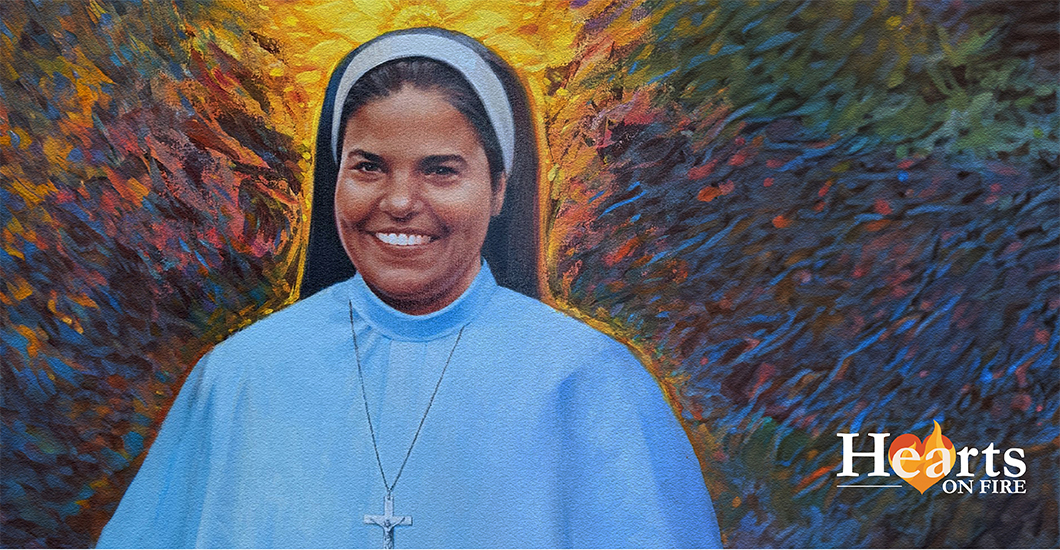
Rani Maria Vattalil was born on 29 January 1954 to Eleeswa and Paily Vattalil in a small village called Pulluvazhy, in Kerala, India. From a young age, she was brought up in the Christian faith, having love for the poor. She attended daily Mass and led family prayers. During the final year of high school, Rani felt the Lord calling her to consecrated life and entered the Franciscan Clarist Congregation in 1972. It was Rani Maria’s ardent desire to do missionary work in North India and serve the poor, even if it cost her life. She was sent to Madhya Pradesh (a central Indian state) and served several mission areas there.
Sister Rani Maria was given the responsibility of coordinating the social apostolate of the local diocese. She organized various educational programs for children and young people and worked relentlessly to empower the indigenous people. She understood how the poor, illiterate farmers were exploited and taken advantage of by their landlords. So, she educated them on their rights, helped them fight for justice, and spoke for those who were unjustly imprisoned. All this infuriated the upperclass landlords, who threatened her with dire consequences if she continued supporting the cause of the poor. But Rani Maria feared nothing and did not back down from her mission to ‘love her neighbor.’ A devious plan was then hatched by those who hated her.
On 25th February 1995, while traveling by bus, she was mercilessly stabbed 54 times by Samundhar Singh—a man hired by the landlords. She breathed her last, repeating the Holy name of Jesus. Rani Maria worked her entire life to fight for the dignity and rights of her fellow men and bore witness to the Gospel through her social activities. Sister Rani Maria’s family, following the valiant example of their daughter, forgave her murderer wholeheartedly, even inviting him to their home! This act of mercy touched him deeply; he repented of his heinous crime and became a changed man.
Sister Rani Maria was beatified by Pope Francis on 4th November 2017.
'
I approached Him for success in my studies, but He didn’t stop there…
During my high school years, I experienced a remarkable journey of faith and academic growth. As a devout Catholic, I firmly believed that God’s presence was constantly with me, especially when it came to my studies.
I remember one particular semester, I was facing a daunting load of exams and assignments. The subjects seemed to pile up, and I felt overwhelmed by the sheer amount of information I needed to grasp. Doubt started to creep into my mind, making me question my abilities.
In those moments of uncertainty, I turned to prayer as my source of solace and guidance. Each evening, I would retreat to my room, light a candle, and kneel before my crucifix. I poured my heart out to God, expressing my fears and doubts while asking for strength, wisdom, and clarity in my studies.
An Invisible Guide
As the weeks went by, I noticed something extraordinary happening. Whenever I encountered a challenging topic or struggled with a difficult concept, I would find unexpected clarity. It was as if a light was being shone upon my path, illuminating the way forward. I would stumble upon helpful resources or passages in books that perfectly explain complex ideas, or receive unexpected support from classmates and teachers.
I started to realize that these were not mere coincidences but rather, the signs of God’s presence and help in my academic journey. It was as if He was guiding me, gently nudging me towards the right resources, the right people, and the right mindset.
As I continued to trust in God’s guidance, my confidence grew, and my grades began to improve. I noticed a marked difference in my ability to absorb information and comprehend complex concepts. I was no longer studying alone; I had an unseen companion by my side, guiding me through every challenge and encouraging me to persevere.
But it wasn’t just about the grades. Through this experience, I learned valuable lessons about faith and trust. I learned that God’s help was not limited to spiritual matters but extended to every aspect of our lives, including our studies. I learned that when we turn to God with sincere hearts, He not only hears our prayers but also provides the support we need.
Keeping Connected
This journey taught me the importance of maintaining a strong connection with God, seeking His guidance, and trusting in His plan. It reminds me that true success is not measured solely by academic achievements but also by the growth of character, resilience, and faith.
Looking back, I am grateful for the challenges I faced during that semester, as they deepened my relationship with God and strengthened my conviction in His unfailing assistance. Today, as I continue my academic pursuits, I carry the lessons learned during that time, knowing that God’s divine guidance will always be there to lead me on the path to knowledge and fulfillment. In a world where academic pressures can often consume us, it is essential to remember that we are not alone in our journey.
As Catholics, we have the privilege of seeking God’s guidance and finding solace in His presence all the time. Through this personal story, I hope to inspire others to trust in God’s unwavering support, not only in their studies but in every aspect of their lives. May we all find comfort in knowing that God is our ultimate teacher, guiding us toward wisdom, understanding, and unshakeable faith.
'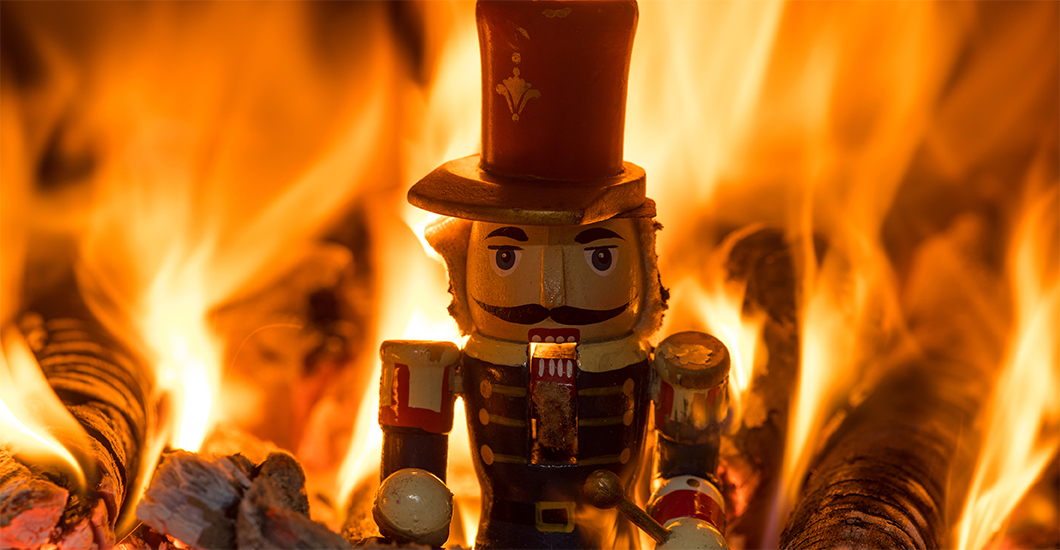
A repeated whisper from above, numerous failed attempts…all solved by a children’s story!
There is a wonderful tale by Hans Christian Andersen entitled The Steadfast Tin Soldier that I have taken immense pleasure in reading aloud to my daughter, and she, in listening to it. This one-legged tin soldier’s brief existence is marked by tribulation after tribulation. From falling from several storeys to nearly drowning to being swallowed by a fish like Jonah, the handicapped fighter comes to understand suffering quite quickly. Through it all, though, he does not hesitate, falter, or flinch. Oh, to be like the tin soldier!
Discovering the Reason
Literalists and pessimists might attribute his steadfastness to the fact that he is made of tin. Those who appreciate metaphor will say it is because he has a deep knowledge of his identity. He is a soldier, and soldiers do not let fear or anything, for that matter, steer them from their course. The trials wash over the tin soldier, but he remains unchanged. At times, he admits that if he were not a soldier, he would do such and such—like shed tears—but those things he did not do, for it would not be in line with who he was. In the end, he is cast into a stove where, reminiscent of Saint Joan of Arc, he is engulfed in flames. His remains are later found by the housemaid, reduced to—or one might say, transformed into—a perfectly shaped tin heart. Yes, the fires that he so resolutely endured molded him into love!
Perhaps, all that is required to become steadfast is to know one’s identity? The question then is, what is our identity? I am, and you are, too, a daughter (or son) of the King of the Universe. If only we know and never cease to claim this identity, we too can be steadfast on the journey toward becoming like Love Himself. If we go about our days knowing that we are princesses and princes gallivanting about our Father’s castle, what would we fear? What would make us quake, turn back, or crumble? No falls or floods or flames could make us step aside from the path toward sainthood that has been so lovingly laid before us. We are beloved children of God, destined to become saints if we only stay the course. The trials will become joys because they will not pull us from our path but, if endured well, will ultimately transform us into that which we long to be! Our hope and joy can always remain, for even if all about us is hardship, we are still beloved, chosen, and made to be with the Father in Heaven for all eternity.
Sorrows into Joy!
When the Angel Gabriel, on his mission to receive Mary’s fiat, sees Mary’s fear, he tells her: “Do not be afraid, for you have found favor with God.” (Luke 1:30) What glorious news! And how glorious that we, too, have found favor with God! He made us, loves us, and desires for us to be with Him always. So, we, like Mary, need not be afraid, no matter what difficulty comes our way. Mary steadfastly accepted all that came her way, knowing that His Providence is perfect and that the salvation of all mankind was at hand. She stood at the foot of the Cross in the moments of her greatest suffering and remained. In the end, though Mary’s heart was pierced by many swords, she was assumed into Heaven and crowned Queen of Heaven and Earth, to be with Love forever. Her steadfastness and loving endurance through suffering paved the way to her Queenship.
Yes, the sorrow of the Pieta became the glory of the Assumption. The martyrdom of so many holy men and women made them a part of the Heavenly host praising the Lord forevermore. Like our Mother and the Saints, may we accept the grace to be steadfast, standing tall amidst sorrow, flames, and all other circumstances that try to divert us from the Lord’s open arms. May we be firmly rooted in our identity as children made in the Father’s image. May we, like the renowned poet Tennyson once wrote: “Be strong in will to strive, to seek, to find, and not to yield!” May we, after it all, become like Love.
'
Keep your ears open to nature’s faintest impulses…God is speaking to you all the time.
God is constantly trying to communicate His message of love to us—in small things, in big things, in everything. Sometimes through the busyness of life, we can often miss what He is trying to say to us, both in the moment and after. Our loving God yearns for us to come to Him in the silence of our hearts. It is there that we can truly encounter Him and begin to grow in our relationship with Him—by listening to the “good teacher” (Luke 18:19; John 13:13). Saint Teresa of Calcutta taught: “God speaks in the silence of our hearts.” Scripture teaches us too, that it was only after the strong wind, earthquake, and fire had disappeared that Elijah was able to hear and understand God through the “still small voice” (1 Kings 19:9-18).
The Power that Moves Us
Recently, I went with my niece to a beach in North Wales; we wanted to fly a kite together. As the sea was going out, we unravelled the string on the sand. I threw the kite in the air as my niece set off running as fast as she could, holding the handle. The beach was partially enclosed by cliffs, so in spite of a strong wind on the waves, the kite did not stay in the air very long. She set off running again, this time even faster, and we tried again and again. After a few attempts, we realised that this wasn’t working.
I looked around and saw that to the top part of the cliffs, there was an open field and a lot of land. So together, we climbed higher. As we began to unravel the string again, the kite began to move; my niece tightly held on to the handle. Before we knew it, the kite was fully extended and flying so high. The beauty of it this time was that we were both able to really enjoy this moment together with minimal effort. The key was the wind, but the power of the soaring kite was actualized in getting to a place where the wind could really blow. The joy, laughter, fun, and love shared in that moment were priceless. Time seemed to stand still.
Learning to Fly High
Later as I prayed, these memories came back to me, and I felt I was being taught powerful lessons in faith, specifically about prayer. In life, we can try to do things with our own strength. There is something in our fallen human nature about wanting to be in control. It is like being at the steering wheel in a car. We can trust God and allow Him to guide us, or we can exercise our free will. God allows us to take hold of the wheel if and when we choose to. But as we journey with Him, we see in fact, that He desires for us to not try and do it all on our own. He doesn’t want to do it all by Himself either. God desires for us to do everything—through Him, with Him, and in Him.
The very act of praying is a gift in itself, but it requires our cooperation. It is a response to His call, but the choice to respond is ours. Saint Augustine powerfully teaches us to “acknowledge our voice in Him and His in us” (CCC 2616). This is not just true for prayer but for everything in life.
True, Jesus sometimes allows us to labor “all night” and “catch nothing.” But this brings us to the realisation that it is only through His guidance that we will achieve what we desire. And infinitely more when we open our hearts to listen to Him. (Luke 5:1-11)
If we are to fly high, we need the wind of the Holy Spirit, the breath of God, which transforms and lifts us up (John 20:22). Wasn’t it the wind of the Holy Spirit that descended upon the fearful disciples in the upper room at Pentecost and transformed them into faith-filled, fearless preachers and witnesses of Christ (Acts 1-2)?
Seeking with a Whole Heart
It is essential to recognize that faith is a gift that we must hold on tight to (1 Corinthians 12:4-11). Otherwise, we can become tangled up in difficult situations in the world that, without His grace, can be impossible for us to be free of. We must continue to reach higher heights through the power of the Holy Spirit—to “seek the Lord and live” (Amos 5:4, 6). Saint Paul exhorts us to “Rejoice always, pray constantly, give thanks in all circumstances; for this is the will of God in Christ Jesus for you.” (1 Thessalonians 5:16-18)
Therefore, the call is for each believer to enter deeper into prayer by creating the space for silence, removing all distractions and blocks, and then allowing the wind of the Holy Spirit to really blow and move in our lives. God Himself invites us to this encounter with the promise that He will answer: “Call to me, and I will answer you and will tell you great and hidden things which you have not known.” (Jeremiah 33:3)
'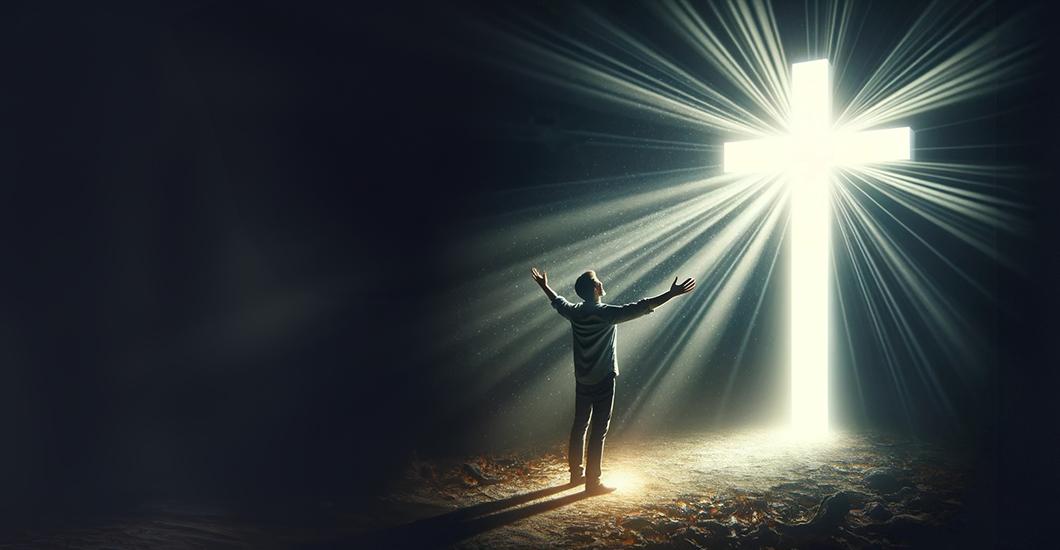
The season of Lent always begins quickly–the starter’s gun fires on Ash Wednesday, and we’re out of the blocks, sprinting determinedly away into the Lenten run.
But, Lenten resolutions—like those of the optimistic New Year variety—have a habit of running away from us. And it doesn’t matter how fast we are or how confident we are in our lead-up to Lent. Life has a way of throwing up unexpected hurdles. Before we know it, we’ve fallen behind in our Lenten practices of prayer, fasting, and almsgiving, especially fasting, Even though it’s incredibly beneficial over the long term, it’s hard to see the finish line from the bends in the Lenten racetrack.
The middle leg of Lent is when these hurdles are often slowing us down. We’ve accepted the baton from the first leg, but now our initial enthusiasm and determination have faded away, and we’re acutely aware of the stitch in our side. No matter how hard we try, the relay runner in front of us is still too far away, and our approach doesn’t seem correct.
A slow or ill-timed changeover decreases the speed of the next leg at best, and, at worst, we end up dropping the baton altogether.
“Latere Sunday,” otherwise known as the fourth Sunday in Lent, is the perfect time to refocus on the joy that the Easter season brings us. This week is the best time to evaluate our spiritual tactics and strategies and get our heads back in the game for the final leg of the Lenten relay.
Approaching this final leg, the sprint to the glory of Easter Sunday is not as daunting as it may sound; we have our Heavenly Father as Head Coach, and His team is here to help us perform to our potential and reach our goals.
1. Confer with a Coach
The spiritual way is a narrow one but that does not mean that it is a path you must follow all on your own. God has provided us with His Son, our Lord Jesus Christ, and many saintly souls to help and inspire us along the way.
Like the teams who support athletes, there is a wealth of knowledge, support and encouragement to be found among the hosts of Heaven, as well as those around us. As Jesus explains in Luke’s Gospel: “Those who are well have no need of a physician, but those who are sick; I have come to call not the righteous but sinners to repentance.” (Luke 5:31) In other words, perfect athletes have no need of a coaching staff.
Few among us are elite athletes and fewer still are elite spiritual athletes. Our coaching staff recognizes this–they know that we need to learn and grow in the ways of the spiritual life. That is why God gave us His Son and why Jesus established the Church on earth. Contained in the deposit of faith, the Magisterium of the Church, the Scriptures, and the Sacraments are all the aids we need, to: “fight the good fight of the faith; take hold of the eternal life to which you were called and for which you made the good confession in the presence of many witnesses.” (1 Timothy 6: -12)
Prayer and regular conferring with our coaching staff is essential. We can also ask for the blessings of the Holy Trinity–collectively or individually–as well as the intercession of our Heavenly Mother, the Saints in Heaven, our own patron Saints, and guardian angels.
On this side of Heaven, we can also seek spiritual direction and help from other faith-filled friends, as well as spiritual directors, priests, and religious to help improve our spiritual techniques.
2. Examen like a Statistician
Professional athletes are often accompanied by statisticians who keep records of the minutiae of sporting performances. Personal bests, goals scored, or finals success are all well and good, but the most important data to the emerging player, or relay runner, are the smaller ones.
These are often a quantifiable way to determine the progress–or regress–in the sporting arena. Slower or faster times and differences noticed as a result of a change in technique, all these help fine-tune the competitiveness of a player, team, or opponent.
The spiritual life is no different. The Church has gifted us a few ways in which we can examine our spiritual progress realistically and make improvements when and where necessary. The first and most obvious one is the Examination of Conscience before the Sacrament of Confession. If you are not regularly examining yourself thoroughly before entering the Confessional, you will find tweaks in this area very beneficial to progressing in your Lenten practices and, all year round.
A smaller and more specific examination of conscience is the daily Examen. Saint Ignatius of Loyola gave us the formula for the simple yet crucial prayer tool in his “Spiritual Exercises”:
1. Become aware of God’s presence.
2. Review the day with gratitude.
3. Pay attention to your emotions.
4. Choose one feature of the day and pray from it.
5. Look toward tomorrow.
The important thing with any examination of conscience is that you identify where you need to improve, resolve to do it, and carry through with it.
3. Practice like a timekeeper
The image of a timekeeper urging on athletes is one we’re all familiar with. They encourage and guide their charges across the finish line. They are invested in the success of the athletes they are keeping time—or scoring—for. They appreciate the value of practice. While the old adage of ‘practice makes perfect’ seems relevant here, I would suggest a variation: perfect practice makes perfect participation.
Of course, I’m not suggesting that you can be perfect, but the level of your commitment to, or investment in your Lenten practices and your entire spiritual journey, must be equal to your enthusiasm for the goal. If you’re determined to finish this last leg of Lent at a sprint, then you need to make sure that you have been working on your speed and endurance before you accept that baton.
Spiritual practices are called so for a reason, and honestly, we’re not going to get them perfect this side of Heaven. But that doesn’t mean that we shouldn’t be investing a lot of time and energy into them. Although we might feel out of condition or far from an elite athlete, that doesn’t mean we shouldn’t step out onto the track in the first place.
We have the ultimate coaching staff, elite statisticians, and timekeepers who are loyal to us and invested in our success. And our success will be eternal.
Join me at the starting blocks, or be there to hand over a baton. Wherever you are in the race, fight the good fight. And I’ll see you on the podium one day.
'
Have you been dreaming of a lasting peace that seems to somehow evade you no matter how hard you try?
It is natural for us to constantly feel unprepared in an ever-changing, unpredictable world. In this scary and exhausting ordeal, it’s easy to become frightened—like a trapped animal with nowhere to run. If only we worked harder, longer, or were more in control, maybe we could catch up and finally be free to relax and find peace.
I have lived this way for decades.
Relying on myself and my efforts, I never really ‘caught up.’ I slowly realized it was an illusion to live that way.
Eventually, I found a solution that has been revolutionary for me. It may feel the opposite of what is required, but trust me when I say this: Surrendering is the answer to this laborious search for peace.
The Perfect Move
As a Catholic, I know that I am supposed to give my heavy loads to the Lord. I also know that I am supposed to ‘let Jesus take the wheel’ so that my burden would become lighter.
My problem was that I did not know how to “give my burdens to the Lord.” I would pray, beg, make the occasional deal, and once, even gave God a deadline (that one ended with me being schooled at a retreat by Saint Padre Pio: “Don’t give God deadlines.” Message received!).
So, what are we to do?
As humans, we base everything on a pixel of information we have at our disposal and an excruciatingly minute understanding of all factors, natural and supernatural. While I may have my thoughts on the best solutions, I hear Him loud and clear in my head: “My ways are not your ways, Barb, nor are my thoughts your thoughts,” says the Lord.
Here’s the deal. God is God, and we are not. He knows everything—past, present, and future. We know squat. Of course, God, in His all-encompassing wisdom, understands things better than us, as well as the perfect move to make in time and history.
How to Surrender
If nothing in your life is working by all your human efforts, surrendering them is essential. But surrendering doesn’t mean looking at God as a vending machine whereby we put in our prayers and select how we want Him to answer.
If, like me, you are struggling to surrender, I would love to share the antidote I found: the Surrender Novena.
I was introduced to it a few years ago and am grateful beyond words. Servant of God, Father Don Dolindo Ruotolo, Spiritual Director to Padre Pio, received this Novena from Christ Jesus.
Each day of the novena brilliantly speaks to every individual in ways only the Lord would know how to address. Rather than the same repetitive words each day, Christ, who knows us all too well, reminds us of all the ways we tend to get in the way of authentically surrendering, thus impeding the Master’s work in His own way and time. The closing statement: “O Jesus, I surrender myself to you, take care of everything,” is repeated ten times. Why? Because we need to believe and fully trust in Christ Jesus to perfectly take care of everything.
'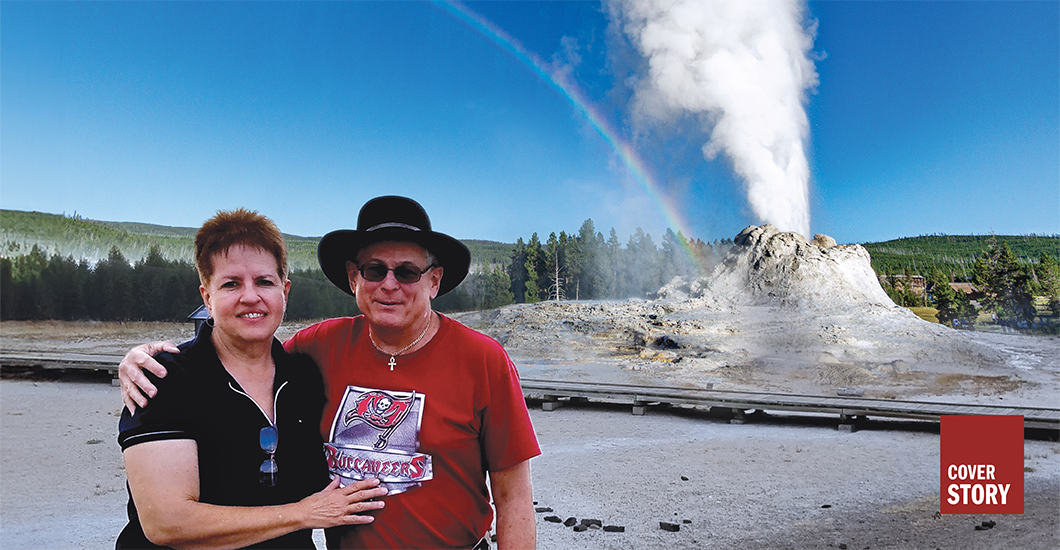
Life seems too difficult sometimes, but if you hold on and trust, unexpected gifts can surprise you.
“Protect us from all fear and anxiety as we wait in joyful hope for the coming of our Savior, Jesus Christ.” Being a lifelong Catholic, I’d recited this prayer at every Mass. Fear hasn’t been my companion for many years, though there was a time when it was. I’d come to know the “perfect love” described in 1 John 4:18, and was helped to live in the reality of He who conquers fear. I seldom experience anxiety at this point in my life, but one morning I did feel a sense of foreboding. I couldn’t quite put my finger on the cause.
Recently, tripping on a curb resulted in a hard fall, and I was still feeling discomfort in my hip and pelvis. Sharp pains resurfacing every time I lifted my arms reminded me that my shoulders still needed more time to heal. New job stresses and the sudden death of a dear friend’s son added to my angst. The state of our world alone can cause significant distress for anyone who spends much time digesting the headlines. Despite the unknown origin of my unease, I knew how to respond. Closing my eyes, I surrendered the heavy burden I was feeling.
Angels Working Overtime
The next day, while I was driving to a patient’s home, a tropical storm developed unexpectedly. Traffic was heavy, and despite beaming headlights and decreasing speed, visibility was obscured by pounding sheets of rain. Out of nowhere, I felt another vehicle’s impact, pushing my car into the right lane! Surprisingly calm, I steered to the emergency lane, despite a now flattened tire’s drag. A fire rescue vehicle soon pulled up; a paramedic who hopped into my car to avoid the torrential downpour inquired if I was hurt. No…I wasn’t! That seemed highly unlikely since it had only been a few days since the lingering aftereffects of my fall had ceased. I’d prayed for protection that morning before setting out, knowing what the weather predicted. Clearly, the angels had been working overtime; cushioning first my fall, then the slam from this crash.
With my car now in the body shop and insurance covering the repairs, my husband Dan and I packed for our long-planned vacation. Just before we left, I was disheartened to hear that our insurer was almost certainly going to total my car! Only five years old and in pristine condition prior to the crash, its Blue Book value currently was a mere $8,150. That wasn’t good news! We intended to keep this fuel-efficient hybrid as long as it would keep running, even purchasing an extended warranty to ensure our plan. Taking a deep breath, I again acted on what I’ve learned to do in situations beyond my control: I released it to God and asked for His intervention.
Unfailing Prayer
Once in Salt Lake City, we secured our rental car and were soon driving through the beautiful Grand Teton National Park. Pulling into the parking garage of the hotel that evening, I uncharacteristically backed into a narrow spot. While Dan unloaded our luggage, I noticed a screw in one tire. My husband’s concern about the puncture prompted him to call various service centers. Finding none open on Sundays, we decided to take our chances driving. The next morning, we said a prayer and set out, hoping the tire would hold while driving on the narrow mountain roads in and out of Yellowstone. Fortunately, the day was uneventful. Arriving at the Hampton Inn, where Dan had made a reservation months before, our jaws dropped! Right next door was a tire repair shop! Monday morning’s quick service meant we were on the road in less than an hour! It turned out that the tire was leaking, so the repair averted a possible blowout—a blessing since we ended up driving over 1200 miles that week!
My body shop, meanwhile, authorized further investigation for “hidden damages” from the accident. If found, the cost would exceed the car’s value and definitely lead to totaling! Praying daily, I yielded the outcome and waited. Finally, I was informed that the cost of the repairs had come in just under the wire…they would fix my car after all! (A few weeks later, as I went to pick up my refurbished car, I found that the cost had indeed exceeded the Blue Book value, but my prayer was answered too!)
A Spectacular Blessing
Another example of God’s providential care came as we continued on our trek into Yellowstone National Park! The parking lot was jammed when we arrived. We circled aimlessly when suddenly, a spot was available near the front! We hurriedly parked and walked over to find out that the next eruption of the Old Faithful* was expected in ten minutes. With just enough time to get to the viewing area, the geyser exploded! We traced the path of the boardwalk through the various geological formations, springs, and geysers. My outdoors-loving husband busily snapped pictures, one after another! Marveling at the amazing spectacle surrounding us, I glanced at my watch…the next eruption of Old Faithful was expected soon. Sprays burst as expected into the air, this time not obscured by tourists since we were on the back side of the geyser! Feeling grateful, I thanked God for the day’s blessings—first, the tire shop’s perfect location, then the good news from the insurance company about my car, and finally, the amazing spectacle of nature.
Reflecting on God’s active presence, I prayed: “Thank you for loving us, Lord! I know You love every other person on earth just as much, but Dan connects with You so strongly in Creation, would You reveal Yourself to him once more?” Continuing to amble along, my husband’s camera battery died. Sitting while he replaced it, I heard a strange sound. I turned around to see a huge explosion. It was spectacular—the Beehive was twice as high as Old Faithful! Looking into our guidebook, we read that this geyser was one of the best, but so unpredictable that eruptions could occur from anywhere between 8 hours to up to 5 days…but, it was at the moment we were there that it happened! For sure, God was manifesting Himself to my husband just as I’d asked!
Our final stop featured several geysers where a gentleman offered to take our picture. The moment he clicked the shutter, that geyser let loose! We experienced yet another unexpected gift of God’s perfect timing and blessing! As if basking in the beauty of the incredible vistas, waterfalls, mountains, lakes, and rivers wasn’t enough, we also experienced beautiful weather! Despite the prediction of rain every day, we encountered only a few brief showers and lovely temperatures day and night!
I had come full circle from my recent stress and anxiety. Surrender led to an immersion in Jesus’ care as well as in the awesome wonder of our Creator! That prayer I had said so many times at Mass was certainly answered! I had been protected, both from fear and serious injury, while being released from anxiety. Waiting had indeed resulted in joyful hope….the anchor for my soul.
'
To be good at anything, we have to put time, effort, and practice into it. The same applies to our preparation for eternity. How well are we going to do at the end of year exams if we have put little or no time towards studying during the year? Similarly, how well will we stand up on judgment day when we are held accountable for our lives? In our preparation period on earth for eternity, how much of our life was spent in prayer, good works, and sacrifice? Our Lord paid the ultimate price for our salvation, but we have to play our part. As He has graciously allowed us to be part of that sacrifice, let us not waste this valuable opportunity. He, through Calvary, has given us a chance to be part of His redemption, to be part of His sanctity, consequently allowing mere humans to be called into sainthood. What a privilege!
As my mother would always remind us, children, this life of ours on earth, short or long, is but a preparation period, the springboard to eternity. How we fare in the structure of eternal life will be determined not only by Jesus’ death and resurrection, but by every thought, word, and deed we perpetrated during the time we spent on earth.
'